Last night’s Vice Presidential debate was a textbook lesson in how to agree to disagree civilly. Senator JD Vance and Governor Tim Walz maintained a high level of professionalism and decorum, even when debating topics where they share little common ground. Perhaps the most remarkable aspect of the debate was the degree to which they had common ground. The debate overall was balanced, with each candidate having a roughly equal proportion of time and turns to speak. Tim Walz had 49 turns to speak and a total of 8237 words overall, while JD Vance had 48 turns and 8248 words overall.
The Vice Presidential candidates’ language is remarkably compatible and similar
Pronoun usage
Their linguistic similarities can be captured in the rates at which they use various language categories. Overall, the two Vice Presidential candidates used personal pronouns at about the same rates. JD Vance used the “I” pronoun more than Tim Walz, while Tim Walz used the pronoun “we” more than JD Vance did. Personal pronouns can help reveal aspects of social interaction like truthfulness and sincerity, which is often signaled by “pronoun drop” – when people omit personal pronouns in their interactions. For example, upon greeting each other, a candidate could say “I am really glad to see you here tonight.” They could also say, “Really glad to see you here tonight.” The former indicates more sincerity and truthfulness; the person truly is more likely to be glad to be in the other’s company. The latter represents a degree of distance and reservation. In this debate, both candidates appeared to be conveying genuine sincerity.
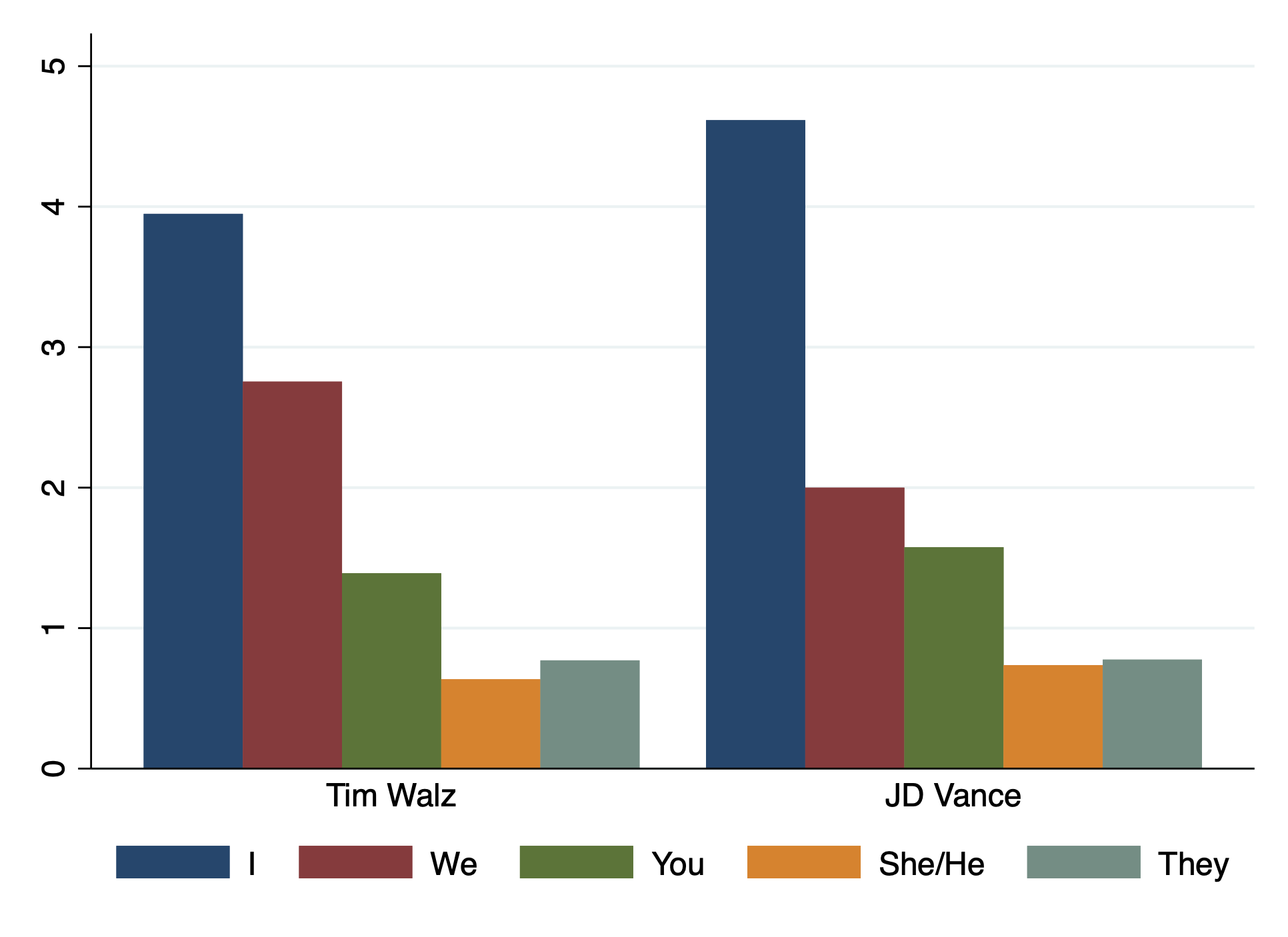
The candidates’ language showed remarkable similarity
Linguistic style matching is the degree to which the speakers’ words and meanings overlap with each other. It represents a degree of coordination between speakers, revealing the degree to which they are “on the same page” with each other. Couples engaged in courtship, or a fight, can begin to interact more similarly through their word choices, breathing patterns, and even heart rates. This process of increasing similarity is called lexical entrainment, and it reflects the process of speakers adopting each others’ words and speech patterns. According to researchers at UT Austin, linguistic similarities between the values of .83 and .94 are about average in conversations between individuals.
In the Vice Presidential debate, we have six groups of speaker pairs, or dyads to measure language similarity. The speakers with the least similarity were Norah O’Donnell and Tim Walz. Unsurprisingly, the speakers with the greatest similarity were JD Vance and Tim Walz. The Vice Presidential candidates were remarkably synchronized in their word choices and ideas.
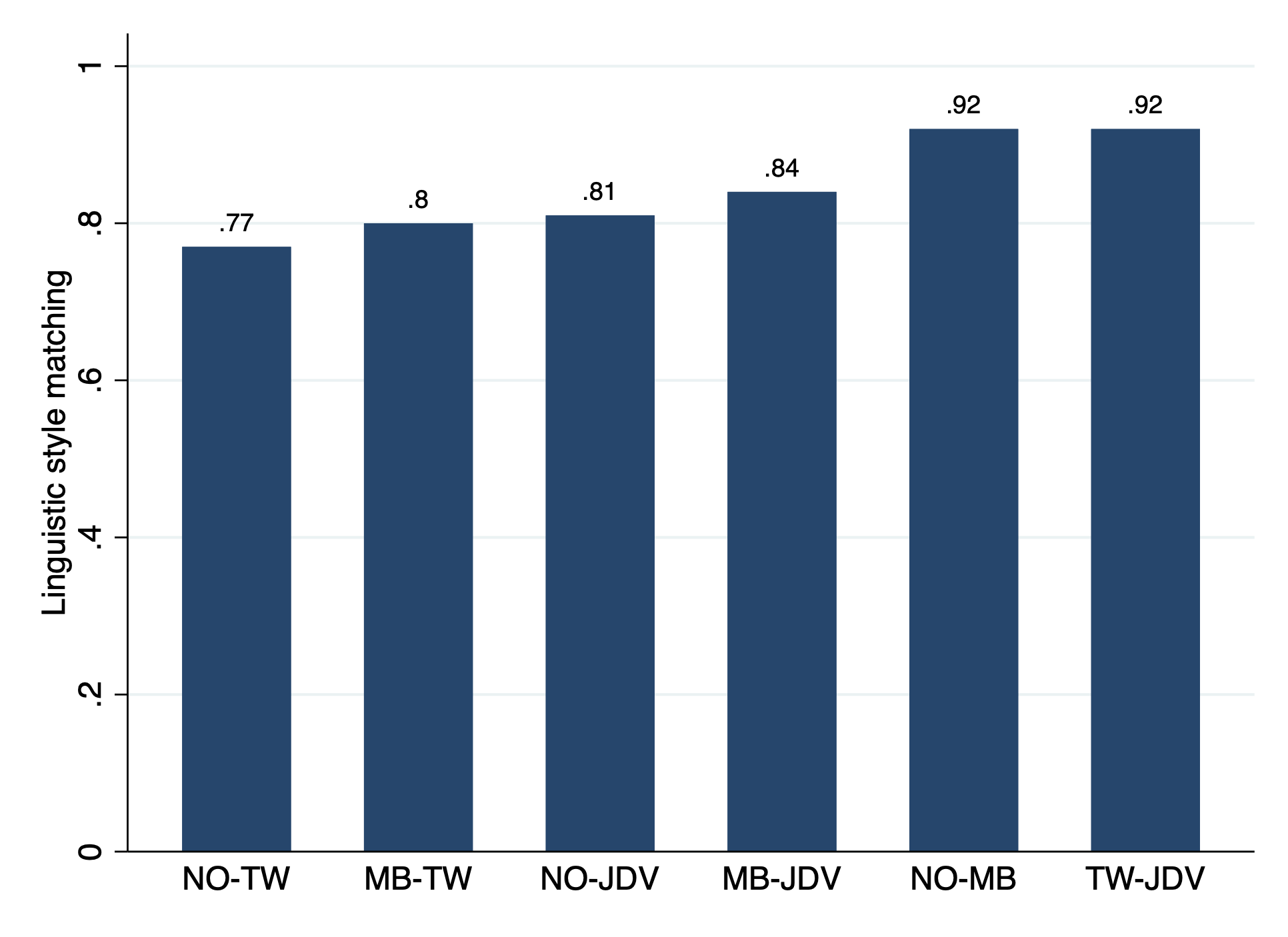
In agreement on most issues
There was a remarkable display of overt agreement during the debate, against the backdrop of a polarized and politically contentious election cycle. When talking about concrete issues, like trade, abortion, and immigration, the candidates acknowledged their common ground. More tangible issues – things you can put a picture to, like the border, abortion, and gun violence – elicited more agreement between the candidates.
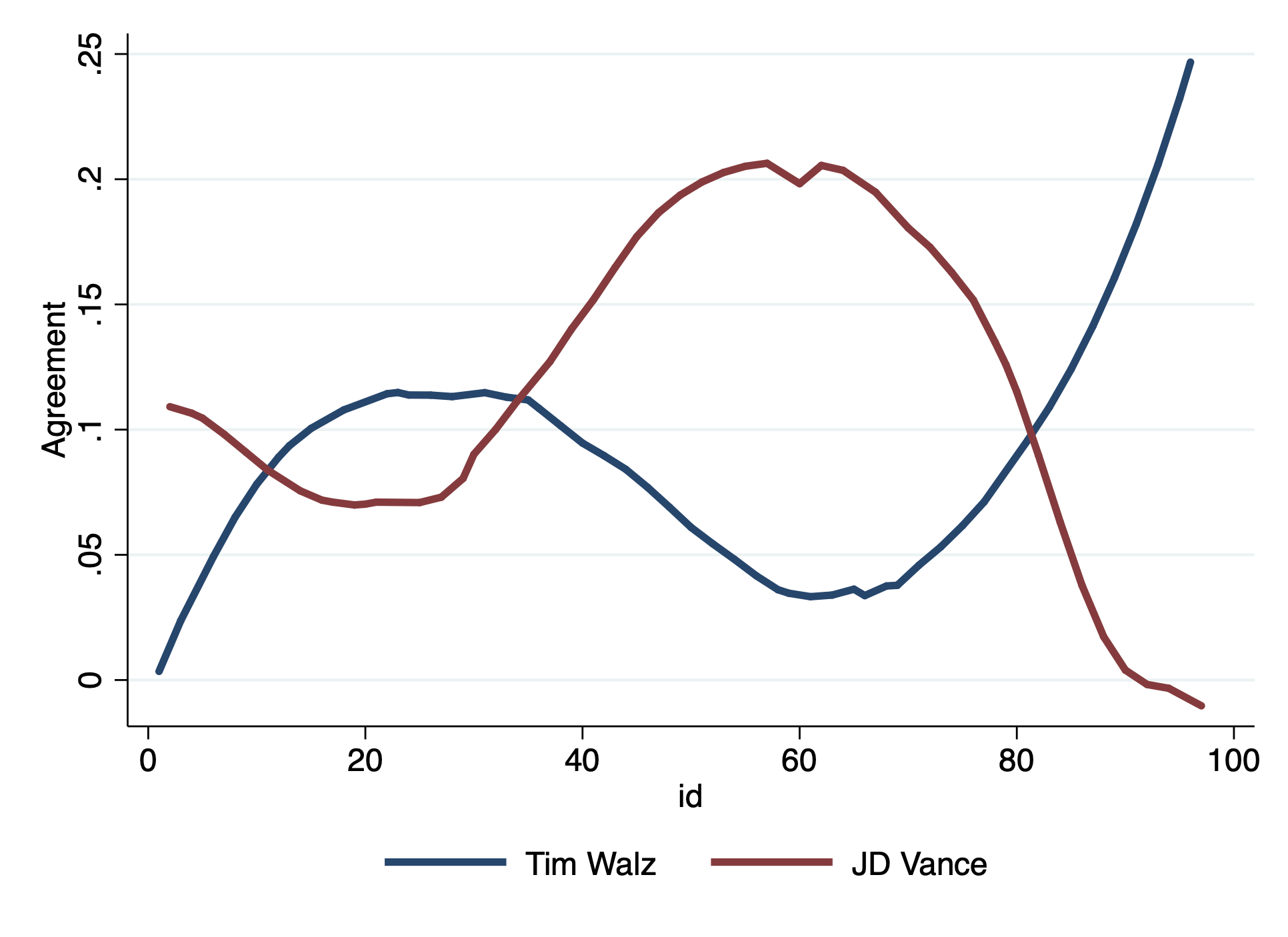
Border security
JD Vance: “It is a disgrace, Tim. And I actually think, I agree with you. I think you want to solve this problem, but I don’t think that Kamala Harris does.”
Immigration
Tim Walz: “Look, this bill also gives the money necessary to adjudicate. I agree. It should not take seven years for an asylum claim to be done.”
JD Vance: “Well, first of all, Tim just said something that I agree with. We don’t want to blame immigrants for higher housing prices.”
Trade
Tim Walz: “Folks that, folks that are venture capital, in some cases, putting money into companies that were overseas, we’re in agreement that we bring those home.”
Abortion
Tim Walz: “I agree with a lot of what Senator Vance said about what’s happening.”
JD Vance: “First of all, Governor, I agree with you. Amber Thurmond should still be alive.”
Gun violence
JD Vance: “And of course, our hearts go out to the families that are affected by this terrible stuff. And we do have to do better. And I think that Governor Walz and I actually probably agree that we need to do better on this.”
Tim Walz: “I 100% believe that Senator Vance hates it when these kids, it’s abhorrent, and it breaks your heart. I agree with that.”
The issue of democracy – an abstract concept – was a point of departure for the candidates. But even in their disagreement, the debate remained coherent and civil, and a model of what political discourse can look like.
Democracy
JD Vance: “And of course, they don’t agree with me and Donald Trump on every issue. We don’t have to agree on every issue, but we’re united behind a basic American First Amendment principle that we ought to debate our differences.”
Tim Walz: “I just think for everyone tonight, and I’m going to thank Senator Vance. I think this is the conversation they want to hear, and I think there’s a lot of agreement. But this is one that we are miles apart on.”
But the candidates offer conceptually different views, vibes, and priorities on some issues
Vance and Walz use emotional language at different rates and patterns
If the candidates were similar in their substance – the issues they talked about – they could not have been more different in their style. Tim Walz was overall more positive during the debate than was JD Vance, with Walz ending on a high note while Vance’s positivity trailed off toward the end of the debate.
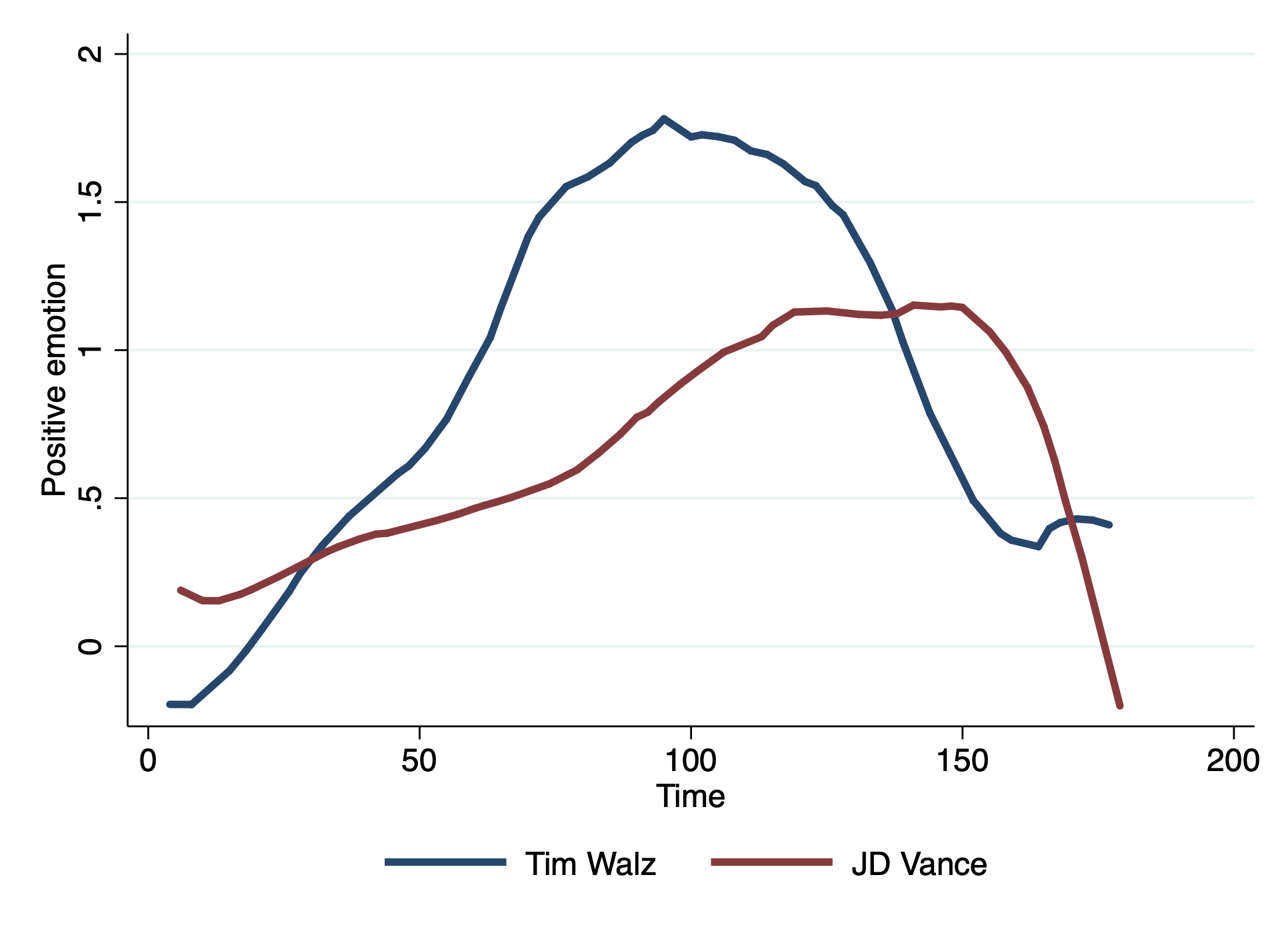
On the flip side, Tim Walz used very few words related to negative emotion at all during the debate, while JD Vance’s use of negatively-valenced words was dynamic and substantially higher than Walz’s.
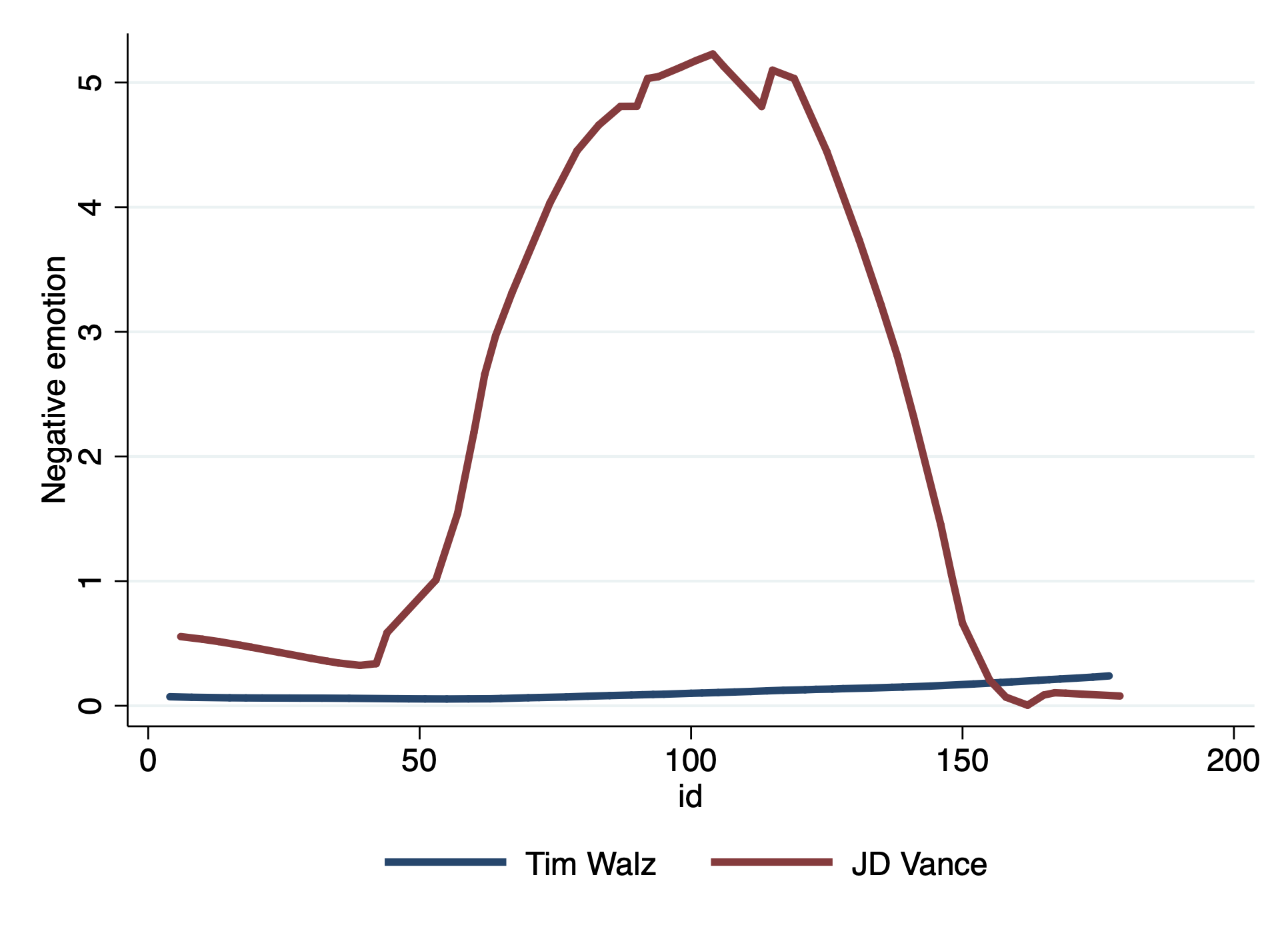
Issue ownership trended along predictable partisan lines
While the debate was exceedingly polite and respectful, the candidates’ focus areas tended to trend along party lines. Senator JD Vance talked more about the border, energy, family, guns, and the Presidential candidates Trump and Harris, while Governor Walz talked more about healthcare, taxes, and women.
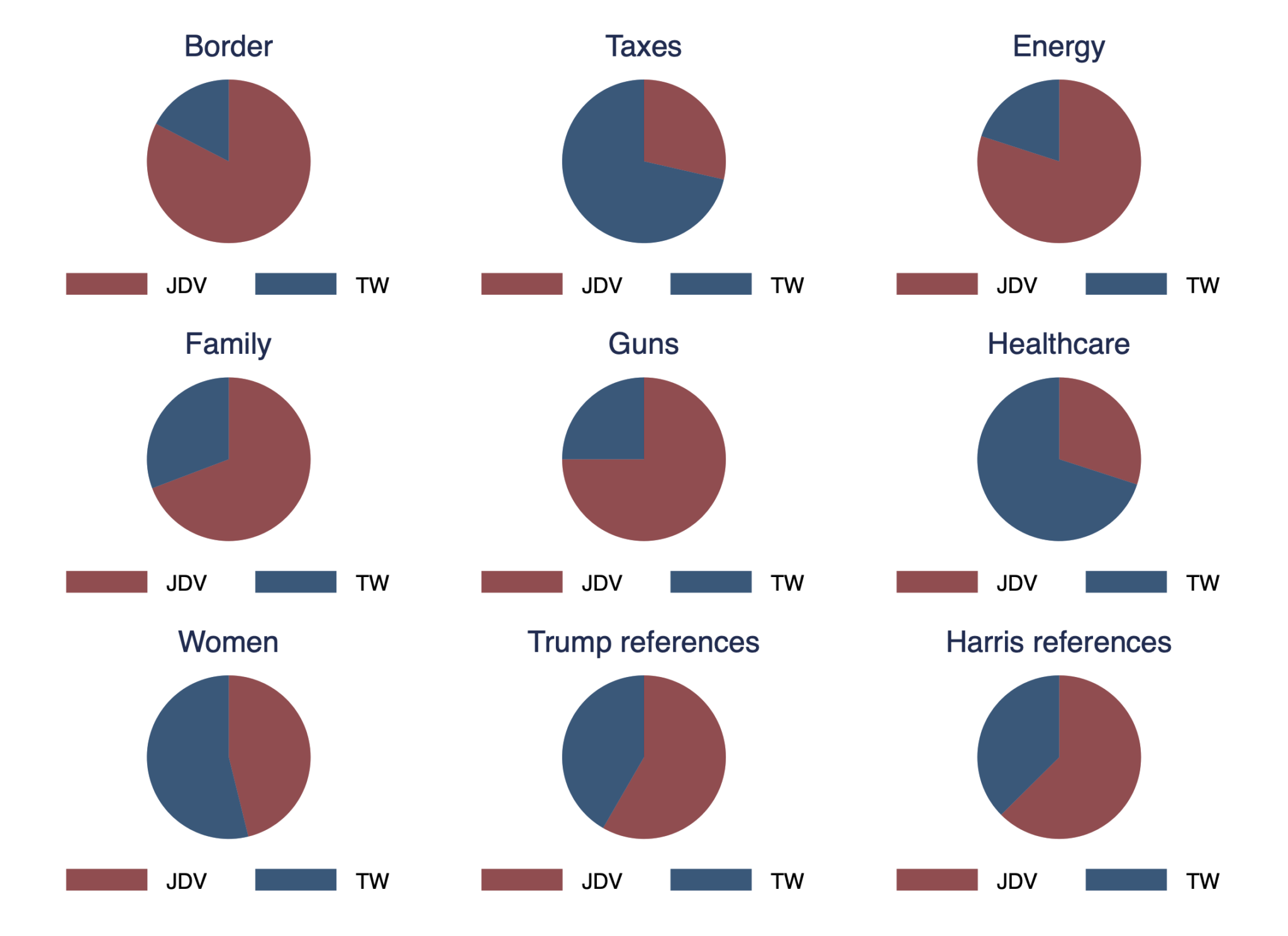
More civil discourse in the future, please
The similarities and differences between the Vice Presidential candidates’ language during their debate can be summarized like this: they are most similar in their style, and least similar in their substance. This is predictable for political candidates from opposing parties, and yet remarkable in the general political environment where everyone from politicians to next door neighbors is finding it hard to find common ground and have a civil conversation. The debate on Tuesday represents the best hope for the future of open and respectful political discourse in the United States.


0 Comments